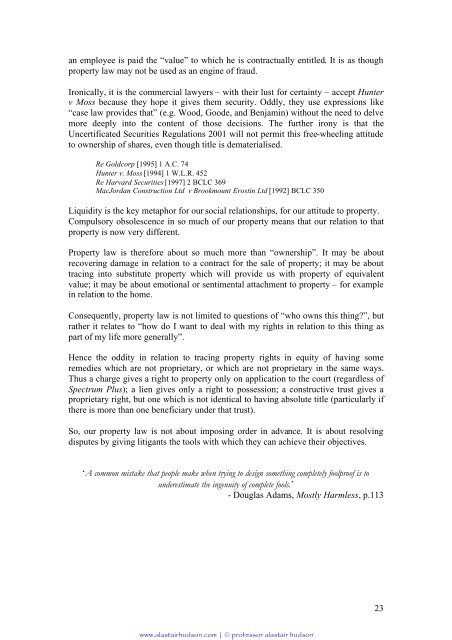England's dreaming equity, trust and conscience - alastairhudson.com
England's dreaming equity, trust and conscience - alastairhudson.com
England's dreaming equity, trust and conscience - alastairhudson.com
You also want an ePaper? Increase the reach of your titles
YUMPU automatically turns print PDFs into web optimized ePapers that Google loves.
an employee is paid the “value” to which he is contractually entitled. It is as thoughproperty law may not be used as an engine of fraud.Ironically, it is the <strong>com</strong>mercial lawyers – with their lust for certainty – accept Hunterv Moss because they hope it gives them security. Oddly, they use expressions like“case law provides that” (e.g. Wood, Goode, <strong>and</strong> Benjamin) without the need to delvemore deeply into the content of those decisions. The further irony is that theUncertificated Securities Regulations 2001 will not permit this free-wheeling attitudeto ownership of shares, even though title is dematerialised.Re Goldcorp [1995] 1 A.C. 74Hunter v. Moss [1994] 1 W.L.R. 452Re Harvard Securities [1997] 2 BCLC 369MacJordan Construction Ltd v Brookmount Erostin Ltd [1992] BCLC 350Liquidity is the key metaphor for our social relationships, for our attitude to property.Compulsory obsolescence in so much of our property means that our relation to thatproperty is now very different.Property law is therefore about so much more than “ownership”. It may be aboutrecovering damage in relation to a contract for the sale of property; it may be abouttracing into substitute property which will provide us with property of equivalentvalue; it may be about emotional or sentimental attachment to property – for examplein relation to the home.Consequently, property law is not limited to questions of “who owns this thing?”, butrather it relates to “how do I want to deal with my rights in relation to this thing aspart of my life more generally”.Hence the oddity in relation to tracing property rights in <strong>equity</strong> of having someremedies which are not proprietary, or which are not proprietary in the same ways.Thus a charge gives a right to property only on application to the court (regardless ofSpectrum Plus); a lien gives only a right to possession; a constructive <strong>trust</strong> gives aproprietary right, but one which is not identical to having absolute title (particularly ifthere is more than one beneficiary under that <strong>trust</strong>).So, our property law is not about imposing order in advance. It is about resolvingdisputes by giving litigants the tools with which they can achieve their objectives.‘A <strong>com</strong>mon mistake that people make when trying to design something <strong>com</strong>pletely foolproof is tounderestimate the ingenuity of <strong>com</strong>plete fools.’- Douglas Adams, Mostly Harmless, p.11323www.<strong>alastairhudson</strong>.<strong>com</strong> | © professor alastair hudson













